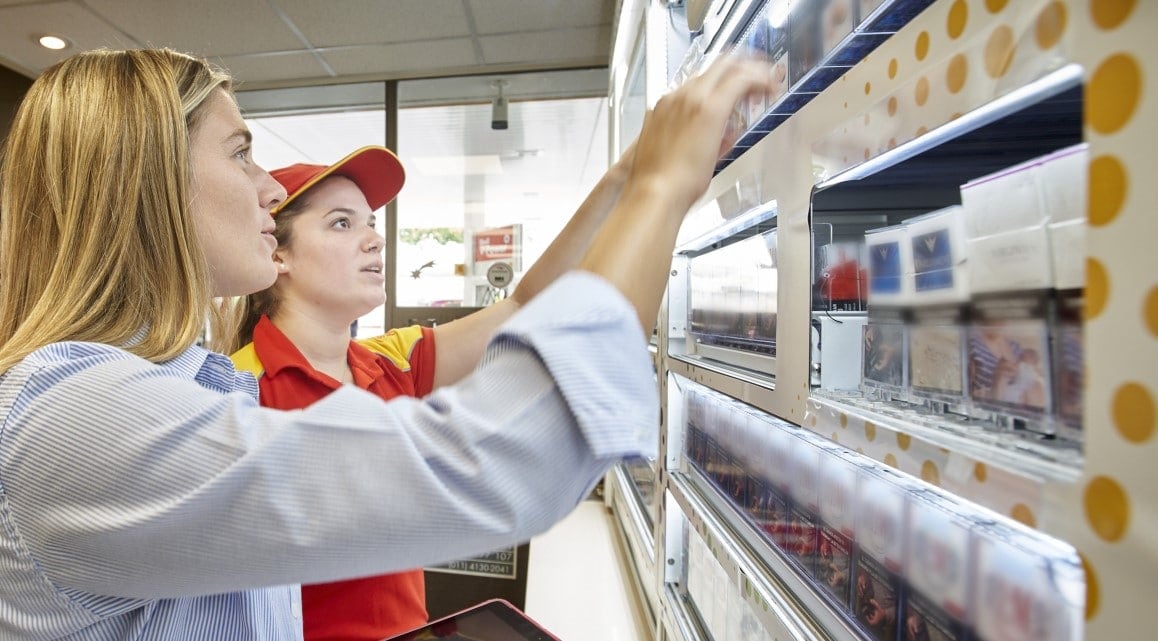| INTEGRATED REPORT 2019 |
Why it is important to us and our stakeholders
The responsible commercialization of tobacco and nicotine-containing products is an issue of vital interest to society. While smoking rates, including youth smoking rates, have gone down in most countries, smoking continues to be a public health issue. Moreover, while the recent availability of innovative smoke-free products offers a significant opportunity to move adult smokers away from cigarettes, efforts to commercialize these products should include steps to minimize the risk that youth and nonsmokers start using these new products.
The marketing and sale of tobacco and nicotine-containing products are at the core of PMI’s revenue-generation model. Our commercialization practices support our business vision: To create awareness among adults who smoke that better alternatives to cigarettes exist and to move those adult smokers who otherwise would not quit to our smoke-free products. Doing this responsibly, by directing our activities toward adult smokers and providing them with accurate and relevant information about our products, is fundamental to our long-term success. Responsible commercialization demonstrates our commitment to regulatory compliance and our own standards, fosters credibility among our stakeholders, and presents an opportunity to accelerate a smoke-free future.
Achieving our aims
We aim to market and sell our products responsibly to adult consumers of tobacco and nicotine-containing products. Providing clear and meaningful information about our products, including the risks of consumption, through our marketing and sales activities, is fundamental to consumers. All our commercialization activities across the world are guided by four core principles:
We only market and sell our products to adult smokers.
We warn consumers about the health effects of our products.
Our marketing is honest, transparent, and accurate.
We respect the law and our high standards.
Our aims:
>90%
Youth access prevention (YAP) programs in place in markets representing over 90% of PMI's total shipment volume by 2020
100%
Percentage of PMI's portfolio of electronic smoke-free devices equipped with age-verification technology by 2023
Our marketing and sales practices are codified in PMI’s Marketing Code for combustible products, which sets the global standards we follow, along with applicable national laws. Our Good Conversion Practices (GCP) are a set of rules articulated to govern the marketing and sale of our smoke-free products. Everyone involved in PMI’s commercialization activities – including employees and third parties acting on our behalf – must strictly follow both the Marketing Code and the GCP without exception and regardless of country.
In regard to our combustible products, the head of each PMI market affiliate is accountable for the affiliate’s compliance with the Marketing Code. All PMI employees who are responsible for the marketing and sale of combustible products, as well as any third parties who are substantively involved in such activities on behalf of PMI, must receive training on the Marketing Code. Third parties, such as creative agencies or individuals who interact with consumers on our behalf, are also contractually bound to comply with the Marketing Code. Each market affiliate that sells smoke-free products must do so in accordance with our centrally developed guidelines, toolkits, training, and other resources. All our marketing materials and activities are reviewed by the relevant functions, to ensure consistency with our Marketing Code and the GCP.
In addition, we have developed global guidelines for digital commercial activities related to the marketing of our smoke-free products, on both the content of our digital marketing and the tools we use to reduce the likelihood of youth being exposed or, most importantly, attracted to these products. We have policies that set out standards and requirements for conducting market research regarding both combustible and smoke-free products. Research is restricted to adults who smoke or use other nicotine-containing products, and all employees or third parties involved in market research activities must be formally trained and contractually bound to comply with the policies. We are reviewing our practices for both combustible and smoke-free products, and we plan to publish a new Marketing Code in 2020.
Three functions – Ethics and Compliance, Internal Controls, and Corporate Audit – support and monitor compliance with the Guidebook for Success (our code of conduct) and our Principles and Practices through training, communications, controls, investigations, and audits. In addition, we are seeking to leverage technology. PMI closely monitors the evolving technology landscape for solutions that increase the accuracy of age verification and minimize the scope for human error. We are aiming for digital age-verification processes that are both effective in preventing youth access, as well as smooth for legal-age consumers, to facilitate switching away from cigarettes. Where possible, we leverage data from legitimate sources, such as government organizations, telephone network operators, or banks, to improve the reliability of our age-verification processes when selling electronic smoke-free devices. In 2019, we were working with third-party data providers in 16 markets to authenticate identification documents, verify that the name on the document matches the name of the purchaser, and check that the purchaser has the legal age applicable in the country. We are aiming to equip all markets where we sell smoke-free products with these solutions to double check prospective purchaser identification documents. In addition, we are developing technology to activate our smoke-free devices for first use only after age verification has taken place. We plan to launch our first smoke-free devices with such technology by the end of 2020, and aim for our full portfolio of electronic smoke-free devices to be equipped with age-verification technology latest by 2023. Secure and user-friendly age-verification technology is a novel technology in the smoke-free product category, which requires strong collaboration with information technology service providers and owners of various software applications. Our teams are reaching out to the main hardware and software players in these industries to assure best-in-class technology is available for PMI’s smoke-free products and the category in general.

Commercializing our products responsibly
Consumer communication and labeling
We warn consumers about the health effects of all our products. All advertising and consumer packaging for combustible products must contain clear and visible health warnings, even in markets where the law does not require them. We apply strict rules to how we communicate about our combustible products with our consumers. As of 2015, we do not use social media to market our combustible products. This applies to all advertising, direct communications, campaigns, and activities, whether branded or unbranded. The same rule applies to our contracted parties, including event organizers, third-party agencies, and brand ambassadors.
Unlike combustible products, smoke-free products are a new category and still relatively unknown. Our priority is to create awareness among men and women who smoke about these better alternatives to cigarettes. Our commercial activities for smoke-free products need to strike the right balance by attracting the interest of the intended audience of adult smokers, so that they consider the product proposition and open themselves to making the effort to try and eventually switch fully to these better alternatives, while at the same time minimizing use by unintended audience like youth and nonsmokers. We also provide information to consumers on the proper use of our smoke-free products. In addition, with regard to labeling, we always include a warning on IQOS heated tobacco units packaging that the product is not risk-free and is addictive. The GCP, which serve as the bedrock of our engagement with adult smokers, must be displayed for staff and consumers at stores and other direct-retail locations we own or control.

In 2019, 14,500 training sessions on our Marketing Code were completed by PMI employees and relevant third parties
Employee and third-party training
Our responsible commercialization efforts rely on the dedication of our employees and the third parties with whom we work. In 2019, 14,500 training sessions on our Marketing Code were delivered through various channels, around half to employees and half to relevant third parties including to suppliers, retailers, and hosts and hostesses (2018: 23,438 sessions). As we plan to publish an updated Marketing Code in 2020, we expect an increase in training sessions to follow as part of the rollout process. We also trained approximately 33,000 people on the GCP in the markets where we sell smoke-free products (2018: 27,100).
Our GCP are discussed during the recruitment of prospective employees and third parties who will interact with adult smokers and consumers of smoke-free products. We hire employees and engage third parties only if they agree to follow the GCP. Additionally, all employees and third parties interacting with consumers of our smoke-free products must complete in-person training on the GCP. Training is reinforced through in-field observation and coaching by supervisors, as well as online annual refresher training.

Monitoring and remediation
PMI has a robust and tested infrastructure aimed at ensuring compliance with its existing policies and processes. We monitor incidents of noncompliance with regulations and/or PMI’s Marketing Code and the GCP concerning marketing communications, including advertising, promotion, and sponsorship. Our Ethics and Compliance function and Corporate Audit department, which reports directly to the PMI Board’s Audit Committee, play a key role in monitoring adherence to our policies on the ground. In 2019, there were 42 substantiated violations of our Marketing Code or our GCP (2018: 8). Eleven of these violations led to termination of employment, 21 to written warnings, and the rest to suspension or verbal warning or counseling.
The increase in the number of violations of the Marketing Code or GCP can be attributed to the launch of a new global training toolkit on GCP that has reinforced the overall awareness, leading to higher speaking-up rates. In addition, there has been a constant increase in the number of IQOS coaches and consequently higher risk of incidences to occur. The number of cases of noncompliance is low, considering that over 35,000 PMI employees and third parties working on our behalf are directly involved in the commercialization of our products. There is also no pattern that would suggest any systemic problems.
Our commitment to youth access prevention
We support regulation that ensures that only adults can buy tobacco and nicotine-containing products, as well as the strict enforcement of minimum age laws and penalties for adults who provide tobacco products to minors. We apply guidelines to all our commercial activities to reduce the likelihood that they will be particularly appealing to minors. At a minimum, for instance, we (i) do not use images or promotional materials that hold particular appeal among minors, including youth-oriented celebrities or cartoons, or brands, toys, or other merchandise that is primarily for, or used by, minors; (ii) do not use models who are or appear to be under the age of 25; (iii) do not use branding on promotional items that are visible to others when the items are used (this refers mainly to clothing items such as T-shirts or caps, which should not display a brand logo when used or worn) ; and (iv) do not pay for product placement in movies, entertainment programs, or theatrical productions, on television or radio, on the internet, or in any other production (e.g., video games) that is intended for the general public.
While PMI alone cannot prevent youth from smoking or using nicotine-containing products, there is a lot we can do, and are doing, to minimize the extent to which our marketing and products reach youth and other unintended users. We engage with various stakeholders on this issue, including retailers and governments. Further, in 2019 – in response to a 2018 shareholder resolution – a cross-functional team at PMI undertook a comprehensive and critical review of the steps we take in our commercial activities to restrict product marketing and sales activities to adults. This work was supervised by the Deputy General Counsel and the Chief Ethics and Compliance Officer, who report to the President, External Affairs and General Counsel. It resulted in Responsible Marketing Practices at PMI, a report approved by PMI’s Board of Directors and published on this website in December 2019.
The report concluded that, throughout PMI, people are deeply committed to the fundamental principle that we should not target our marketing and sales activities to minors. Our findings indicate a strong adherence to our responsible marketing policies and practices. The systems we have in place to detect noncompliance are working, we have taken all allegations of noncompliance seriously, and we have addressed issues that have been identified in a timely fashion. As part of our assessment, we also considered opportunities to strengthen our existing responsible marketing policies and practices. We discuss several of these measures below.
Monitoring our efforts on youth access prevention
Reviews by our Corporate Audit department in 2019 showed that only a few affiliates had issues related to responsible marketing compliance, and they were mainly procedural. During 2019, Corporate Audit conducted additional field visits in each of PMI’s six business regions with a focus on checking compliance with Marketing Code provisions related to our responsible marketing standards. Corporate Audit selected one country in each business region (China, Greece, Mexico, Indonesia, Russia, and Turkey). Members of the Corporate Audit team visited a limited number of points of sale in each of these countries to assess compliance with the Marketing Code provisions. No issues related to youth access were identified in any of the locations visited.
We also run a mystery shopping program in a sample of our smoke-free product retail stores. We contract an independent third party, which uses secret shoppers to measure the quality of services offered in our stores as well as their compliance with our GCP. We are evaluating whether this program can be scaled up to provide robust feedback on the consistency of age controls at our stores. We encourage any member of the general public who notices PMI marketing materials or sales practices that he or she believes are inappropriate to contact us so that we can review the situation and take action as necessary.
Social media influencers
We take seriously and investigate thoroughly any specific allegation regarding youth targeting, use, or access via social media in which the company may have been implicated. For example, we received an inquiry in 2019 from a media stakeholder about social media posts that did not appear to comply with our internal “digital influencer” guidelines. Our investigation revealed that, while no laws were broken, we fell short of our internal guidelines for digital influencer activities in certain instances (a paid digital influencer was above the legal age for smoking but under 25, the minimum age required by our internal guidelines). On October 16, 2019, senior management decided that we would no longer engage with anyone for the purpose of generating social media posts about our products.
Engaging with our trade partners
We do not own or control the vast majority of retail outlets around the world where people buy our products. However, we set robust standards for our direct trade partners and work with them to guard against sales to youth. During 2019, we surveyed PMI affiliates around the world on their youth access prevention programs. The results showed that not all affiliates had active programs in place and that the scope varied by country. In response, we developed a set of guidelines and tools that will help our affiliates work more effectively with their trade partners to guard against sales to underage purchasers. The tools include templates for contract clauses that, for example, require retailers to ensure strict compliance with minimum age laws or, in the absence of such laws, to refuse sales of nicotine-containing products to anyone under the age of 18. The tools also include educational modules on youth access prevention on the digital communication platform we use with our retail trade partners in various countries (68 countries, approximately 530,000 registered points of sale). The modules include educational materials on youth access prevention for both combustible and smoke-free products, as well as knowledge checks. Trade partners who currently use the platform will be required to complete the educational modules by the end of 2020. Other tools we provide include point-of-sale signage, communications templates to be used by our affiliates, and training to guide in-person conversations. By the end of 2019, markets representing over 90 percent of PMI’s total shipment volume had developed youth access prevention plans, which are expected to be implemented in 2020.

We apply guidelines to all our commercial activities to reduce the likelihood that they will be particularly appealing to minors

Next steps
As described above, PMI has a robust infrastructure for monitoring compliance with our Principles and Practices. In 2020, we will continue implementing our programs with trade partners on youth access prevention. We will include the risk of marketing and selling to youth in our annual integrated risk assessment and in our risk-based Corporate Audit program. We will maintain our monitoring of social media and audience data to detect any ongoing inappropriate marketing activities. We will also introduce additional monitoring and controls for age verification for online sales and home deliveries of smoke-free products. And we are exploring ways to strengthen our controls of our commercialization practices.
Furthermore, we aim to equip all our electronic smoke-free devices with age-verification technology latest by 2023. PMI’s ongoing transformation includes a heightened level of transparency. We will continue to monitor stakeholder feedback and track and address any complaints.
This online supplement to our integrated report should be read in conjunction with PMI’s Integrated Report 2019. The information and data presented in this online supplement cover the 2019 calendar year or reflect status at December 31, 2019, worldwide, unless otherwise indicated. Where not specified, data come from PMI estimates. See About this online supplement for more information. Aspirational targets and goals do not constitute financial projections, and achievement of future results is subject to risks, uncertainties and inaccurate assumptions, as outlined in our forward-looking and cautionary statements.





